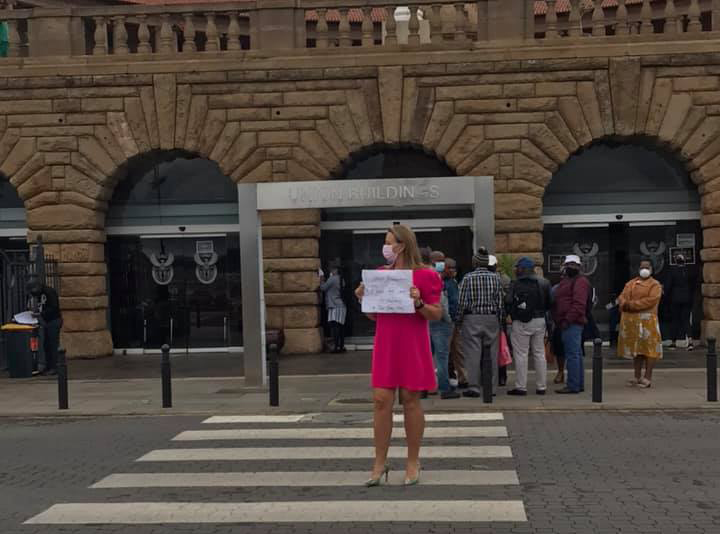Members of the Restaurant Association of South Africa (RASA) are currently camped outside the Union Buildings in Pretoria in protest against the ongoing alcohol ban that is having a detrimental impact on several industries.
Wendy Alberts, the CEO of RASA, indicated the protest would continue until President Ramaphosa agrees to meet.
“This will be my office until the president talks to me and the rest of our constituency and stakeholders,” said Alberts on Wednesday, January 28 – her third day of protest outside the entrance to government, according to TimesLIVE.
RASA, which is supported by about 11 000 restaurants, is calling for the adjusted lockdown level 3 lockdown curfew and ban on liquor trade to be lifted. The Association intended to deliver a memorandum to Ramaphosa on Monday [January 25]. The memo calls for an inter-ministerial meeting as there has been very little communication from government since the ban was imposed on December 28, says Alberts.
Alberts believes the losses sustained by the industry over the festive period means that many in the industry will not survive another week.
“We have research that shows our industry cannot survive for another week and that is why we are sitting here as a last resort to get government to hear us,” said Alberts.
“If we do not get the curfew lifted, 12% of restaurants will close within a day, 38% will close within one week, 48% will close within a month and only 6% will be able to survive past the month,” she added.
“These numbers are quite dramatic. If the liquor ban is not lifted, we are looking at the same figures.”
While we wait for confirmation of the Inter ministerial Meeting. We invite Minister Nxesi to explain to us how he passed the National Bargaining Councils extension we are outside the Union Buildings@NxesiThulas #jobssavelives #restaurantslivesmatter #onemillionemptyseats pic.twitter.com/bnbsL00dBY
— Restaurant Association of South Africa (@RestaurantAsso2) January 26, 2021
Meanwhile, role players in the wine industry are preparing to go to court to have the alcohol ban overturned.
“Faced with the devastating impact that the third ban has had on the wine industry, Vinpro was left with no choice but to approach the Cape High Court, ” said Vinpro Managing Director, Rico Basson in a statement on Wednesday.
The matter will be heard in court on February 5. Vinpro, which represents 2500 South African wine producers, cellars and industry stakeholders, feels that government has not been transparent enough about its justification of the ban.
“Nor did they give any explanation or clarity on the timeline for a review of this ban. This makes planning and contingency plans impossible,” said Vinpro.
“The company believes that the provincial government should be empowered to handle the retail sale of liquor for the rest of the pandemic, as they “are better equipped to manage the delicate balance between lives and livelihoods.”
“Urgent interim relief will be sought which would afford the Premier of the Western Cape the power to adopt deviations to enable off- and on-consumption of liquor in the province. Ultimately similar relief would be sought in respect of other provinces,” said Vinpro.
On Tuesday, January 19, Western Cape Premier Alan Winde said the alcohol ban could cost the Western Cape economy R2-billion if it is allowed to continue for a full month.
He declared that he would write to government about relaxing several lockdown restrictions in the province, including the alcohol ban and curfew.
The Western Cape Department of Agriculture said the province’s winemakers are stuck with 289-million litres of surplus wine they could not sell because of the government-imposed restrictions, according to News24.
This is a dilemma as the current harvest is due to start this week and producers have no space to store it, which threatens the sustainability of the wine industry, according to Vinpro.
The industry now has to decide whether it will dump its excess products, which would be an environmental risk, or convert them into other alcohol-based products such as hand sanitiser at a loss, according to Dirk Troskie, the director of business planning and strategy at the Department.
Picture: Facebook/Wendy Alberts

